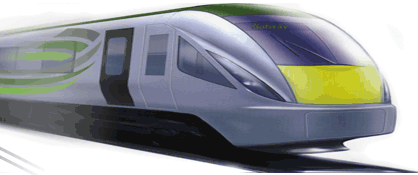West=On=Track -
News
Is Dublin deaf to dissent
from beyond the Pale?
Irish Independent
Thursday February 26th 2004
by Marese
McDonagh
There is a growing
"them and us" syndrome between Dublin and the rest of the
country and people who live outside the city are mad as hell
about a lot of things.
If the campaign to
re-open a disused rail link through the western part of the
country doesn't get the green light, it's going to be
perceived as yet another indication that nobody is listening
in the capital city.
A Sligo-based IFA
official, Joe Coulter, warned recently that the country
might just "topple into the Irish Sea" if a serious effort
is not made to correct the population imbalance.
He was speaking in
advance of the Minister for Transport, Seamus Brennan's
visit to five railway stations on the Sligo/Limerick line,
which closed to passengers in the 1960s.
There is grass
growing on the track at most of the 20 stations on this
route. Colman O Raghallaigh, spokesman for the lobby group
West on Track, said that when they closed it down the
government of the day "pulled out of the west and told the
people they could go to America or England".
But, as the
Minister was told, they may have closed it down but thanks
to the Minister's intervention in the late 1980s, when he
held the same portfolio, they never took away the line and
the thoroughfare is still in public ownership.
Consultants believe
that as a result, the capital costs of restoring the service
would be just under euro250m.
Minister Brennan is
insisting that no section of the line can be reopened until
the sums are done because it is taxpayers' money which is at
stake. Kiltimagh man Joe Kelly wondered if there was such
rigorous value-for-money examination of projects like the
Luas and Metro.
Luas gets mentioned
a lot in the context of the western rail corridor. The
consultants who examined the project pointed out that the
114 miles of rail between Collooney, Co Sligo, and Ennis,
could be made operational for the equivalent of five miles
of Luas or 2.5 miles of Metro.
The Galway-born
Minister may have felt he was on home ground when he went
west recently but on his visit he was effectively welcomed
to one of the colonies.
Father Micheal Mac
Greil, a sociologist in Kiltimagh, Co Mayo, explained to
Minister Brennan that for several years now, people living
in the west, the Midlands and parts of Ulster have started
to believe that they are a colony of the expanded Pale.
Father Mac Greil has spent 25 years hounding successive
governments about this rail project and took the opportunity
to educate the relevant Minister about a condition he dubbed
"post-colonial attitudinal schizophrenia".
Interestingly,
after Minister Brennan walked the line at five stations in
counties Sligo, Mayo and Galway, his audience seemed equally
divided between those who believed he had delivered nothing
and those who can already hear the commuter trains whizzing
between Athenry and Galway.
The Minister's
promise to set up a working party to examine which sections
of the line might be considered first, was greeted with
snorts of derision from his political opponents. Sligo/
Leitrim Independent TD, Marian Harkin, a former chair of the
Council for the West, said she was dumbfounded by the lack
of a financial commitment, especially given the euro37m to
be spent to allow Luas "cross the road" at one Dublin
roundabout.
Fine Gael's Michael
Ring said the country was full of reports. "What we want are
euros," he insisted.
West on Track have
derided the "negative spin" put on the Minister's words, but
Father Mac Greil, with no pun intended, had to "read between
the lines" to find the positive news. And while the
battle-hardened campaigner insisted that agreement in
principle had now been delivered, Father Mac Greil said he
had also hoped that "a bit of track would be delivered in
the short term".
The Minister did
make a pointed reference to the potential of a commuter
service between Tuam and Athenry and O Raghallaigh believes
that work on this section of the line will begin in
2005.
The Minister's
comment that the line would not be built on sentiment or
emotion alone clearly nettled some of those who had already
done their sums and believe the line will generate more than
enough income to pay its running costs.
But as with all
great rail lines there is sentiment attached. Dozens of
local people, many of them elderly, turned out to meet the
Minister when he and his entourage crowded into stations in
Claremorris, Kiltimagh, Charlestown, Tubbercurry and Tuam
.
In Kiltimagh,
79-year-old Henry King said that as a temporary postman he
had witnessed many tears being shed in the station when he
delivered mail to the train in the 1950s. "A lot of people
left from that station and went across channel and they
never came home," he said.
West on Track
believes what is needed now is a commuter service for the
thousands of workers who do not have to emigrate but who
cannot park their cars in cities like Sligo and Galway.
Traffic congestion is now costing Galway euro1.8m every
week, with the volume of traffic on the N17 from Tuam up
nearly 40pc in the last five years.
All week local
radio stations have told the stories of those whose lives
could be changed by a decent public-transport system. As one
business man in Mayo said: "We do not want to be seen as
whingers. We are just here to make our case."
|
